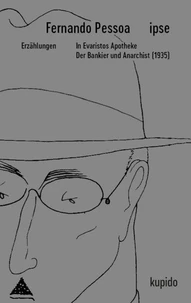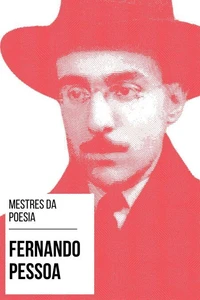Antinous: A Poem
Par :Formats :
Disponible dans votre compte client Decitre ou Furet du Nord dès validation de votre commande. Le format ePub est :
- Compatible avec une lecture sur My Vivlio (smartphone, tablette, ordinateur)
- Compatible avec une lecture sur liseuses Vivlio
- Pour les liseuses autres que Vivlio, vous devez utiliser le logiciel Adobe Digital Edition. Non compatible avec la lecture sur les liseuses Kindle, Remarkable et Sony
 , qui est-ce ?
, qui est-ce ?Notre partenaire de plateforme de lecture numérique où vous retrouverez l'ensemble de vos ebooks gratuitement
Pour en savoir plus sur nos ebooks, consultez notre aide en ligne ici
- Nombre de pages106
- FormatePub
- ISBN859-65--4771787-4
- EAN8596547717874
- Date de parution10/11/2023
- Protection num.Digital Watermarking
- Taille347 Ko
- Infos supplémentairesepub
- ÉditeurDIGICAT
Résumé
In "Antinous: A Poem, " Fernando Pessoa crafts a profound exploration of identity, desire, and the human condition through the lens of the tragic romance between the Roman Emperor Hadrian and his beloved Antinous. Written in his signature fragmented and multifaceted style, this poem integrates Pessoa's unique heteronymic approach, allowing readers to encounter various voices that traverse themes of beauty, mortality, and mysticism.
The work draws on classical references while situating itself within the context of modernist poetic innovation, creating a symbolic dialogue between past and present that resonates with contemporary existential inquiries. Fernando Pessoa, a towering figure of early 20th-century Portuguese literature, often grappled with themes of self-identity and fragmentation, mirroring his own complex persona composed of various heteronyms.
His extensive exploration of philosophical and artistic ideas-shaped by influences such as Symbolism and Modernism-led him to write "Antinous, " reflecting his fascination with lost love, mythology, and the ephemeral nature of existence. Pessoa's intense introspection and deeply reflective style engender a rich environment for readers seeking to understand the profundities of human emotion. This exquisite poem is a must-read for those interested in the interplay of love and loss, as well as the tension between historical grandeur and personal quest.
Pessoa's evocative language invites readers to engage intimately with his vibrant yet haunting portrayal of Antinous, making it an essential addition to the libraries of poetry enthusiasts and scholars alike.
The work draws on classical references while situating itself within the context of modernist poetic innovation, creating a symbolic dialogue between past and present that resonates with contemporary existential inquiries. Fernando Pessoa, a towering figure of early 20th-century Portuguese literature, often grappled with themes of self-identity and fragmentation, mirroring his own complex persona composed of various heteronyms.
His extensive exploration of philosophical and artistic ideas-shaped by influences such as Symbolism and Modernism-led him to write "Antinous, " reflecting his fascination with lost love, mythology, and the ephemeral nature of existence. Pessoa's intense introspection and deeply reflective style engender a rich environment for readers seeking to understand the profundities of human emotion. This exquisite poem is a must-read for those interested in the interplay of love and loss, as well as the tension between historical grandeur and personal quest.
Pessoa's evocative language invites readers to engage intimately with his vibrant yet haunting portrayal of Antinous, making it an essential addition to the libraries of poetry enthusiasts and scholars alike.
In "Antinous: A Poem, " Fernando Pessoa crafts a profound exploration of identity, desire, and the human condition through the lens of the tragic romance between the Roman Emperor Hadrian and his beloved Antinous. Written in his signature fragmented and multifaceted style, this poem integrates Pessoa's unique heteronymic approach, allowing readers to encounter various voices that traverse themes of beauty, mortality, and mysticism.
The work draws on classical references while situating itself within the context of modernist poetic innovation, creating a symbolic dialogue between past and present that resonates with contemporary existential inquiries. Fernando Pessoa, a towering figure of early 20th-century Portuguese literature, often grappled with themes of self-identity and fragmentation, mirroring his own complex persona composed of various heteronyms.
His extensive exploration of philosophical and artistic ideas-shaped by influences such as Symbolism and Modernism-led him to write "Antinous, " reflecting his fascination with lost love, mythology, and the ephemeral nature of existence. Pessoa's intense introspection and deeply reflective style engender a rich environment for readers seeking to understand the profundities of human emotion. This exquisite poem is a must-read for those interested in the interplay of love and loss, as well as the tension between historical grandeur and personal quest.
Pessoa's evocative language invites readers to engage intimately with his vibrant yet haunting portrayal of Antinous, making it an essential addition to the libraries of poetry enthusiasts and scholars alike.
The work draws on classical references while situating itself within the context of modernist poetic innovation, creating a symbolic dialogue between past and present that resonates with contemporary existential inquiries. Fernando Pessoa, a towering figure of early 20th-century Portuguese literature, often grappled with themes of self-identity and fragmentation, mirroring his own complex persona composed of various heteronyms.
His extensive exploration of philosophical and artistic ideas-shaped by influences such as Symbolism and Modernism-led him to write "Antinous, " reflecting his fascination with lost love, mythology, and the ephemeral nature of existence. Pessoa's intense introspection and deeply reflective style engender a rich environment for readers seeking to understand the profundities of human emotion. This exquisite poem is a must-read for those interested in the interplay of love and loss, as well as the tension between historical grandeur and personal quest.
Pessoa's evocative language invites readers to engage intimately with his vibrant yet haunting portrayal of Antinous, making it an essential addition to the libraries of poetry enthusiasts and scholars alike.






